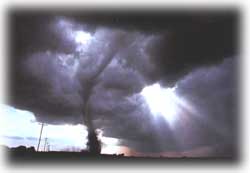|
|
Thomas Sowell
El NINO OR NOT, every few years heavy rains hit the California coast and fancy homes go
sliding down the hills and cliffs. However, if people want to build or buy homes in
precarious locations, that is their own business. When these homes go sliding down
into the ocean, that should also be their own business.
Unfortunately, it is the taxpayers' business because politicians can buy a
compassionate image by giving away tax money from the treasury to help people
This is worse than insanity. It is subsidized insanity.
Whether for an individual or for the whole human species, we usually learn how foolish
we have been only by suffering the consequences. The consequences don't even have
to be dire. All you need to do when you are planning to build, rent or buy a house on
the edge of a cliff overlooking the ocean is discover how much higher your insurance
premiums will be in such a location.
That is the whole purpose of free market prices -- to convey realities to you in a form
that you cannot ignore. Unfortunately, one of the main purposes of contemporary
politics is to shield you from these same realities.
The country as a whole cannot be shielded from realities, no matter what policies are
followed or how often words like "compassion" are used. The country's total resources
are not one dime greater after compassion, rights and entitlements are handed out
hither and yon.
All the government can do is rob Peter to pay Paul -- or rob both Peter's and Paul's
children by leaving them a larger national debt to pay.
If the country as a whole is no better off, then why do these emergency disaster relief
programs exist? Because politicians are better off.
After floods, fires, hurricanes and other natural disasters, all sorts of national and local
officials can be photographed going around expressing compassion, declaring "disaster
areas" and promising to help. There is nothing like televised compassion, especially in
an election year.
Since there are no more resources available when politicians do this than when they
don't, this is not about making the victims better off, but about making politicians better
off.
In the absence of any government disaster relief, people would either buy insurance
covering these same disasters or would locate in places that were not as dangerous.
This would make them better off in at least two different ways.
First of all, staying away from places where they are in danger would reduce the total
losses. Secondly, insurance companies usually pay off faster than government
agencies. Allstate can't drag their feet when it comes to paying up in these
emergencies or people will take their business to State Farm, or vice-versa.
A federal or state agency faces no such competition. Each agency is a monopoly. The
people who run these agencies get paid the same amount, whether they get you the
money when you need it or diddle around while the forms are slowly making their way
from Washington or from the state capitol.
When all else fails, those who believe in big government can invoke "the poor."
However, poor people are not building homes overlooking the ocean or perched high up
in the hills, among flammable vegetation.
If you are really concerned about the poor, you might ask why some factory worker in
Indiana should be paying taxes to rebuild somebody's mansion that fell into the sea in
Malibu.
The media love to interview disaster victims who say that they are going to go back to
the homes that were burned, flooded or otherwise done in. It is supposed to show
"courage."
If they did this with their own money that might show courage -- or foolhardiness, as
the case may be. After all, it is no great secret that houses slide down hills in California
during winter rains and burn up during the summer brush fire season. Nor is there any
great mystery about hurricanes striking the Gulf coast or that various other places
around the country are subjected to flooding again and again over the years.
When it is subsidized, it is not courage. And when it is somebody else's tax money
being handed out, it is not
 Disasters --- natural and political
Disasters --- natural and political
 rebuild their homes -- usually in the same place, subject to the same dangers as
before.
rebuild their homes -- usually in the same place, subject to the same dangers as
before.
3/24/98: "A pattern of behavior"
3/22/98: Innocent explanations
3/19/98: Kathleen Willey and Anita Hill
3/17/98: Search and destroy
3/12/98: Media Circus versus Justice
3/6/98: Vindication
3/3/98: Cheap Shot Time
2/26/98: The Wrong Filter
2/24/98: Trial by Media
2/20/98: Dancing Around the Realities
2/19/98: A "Do Something" War?
2/12/98: Julian Simon, combatant in a 200-year war
2/6/98: A rush to rhetoric